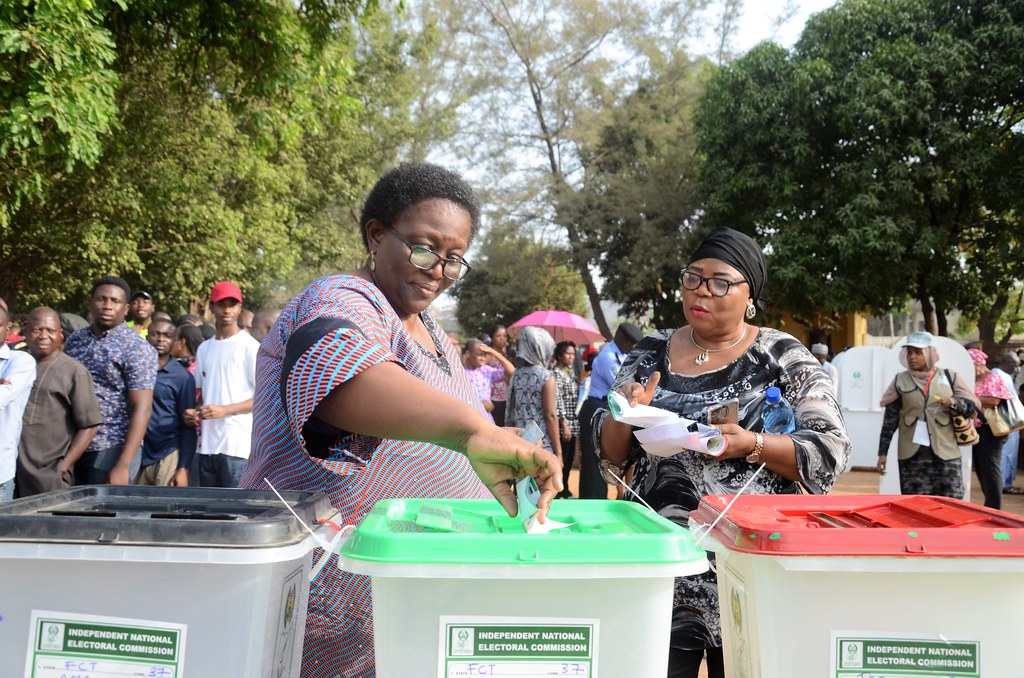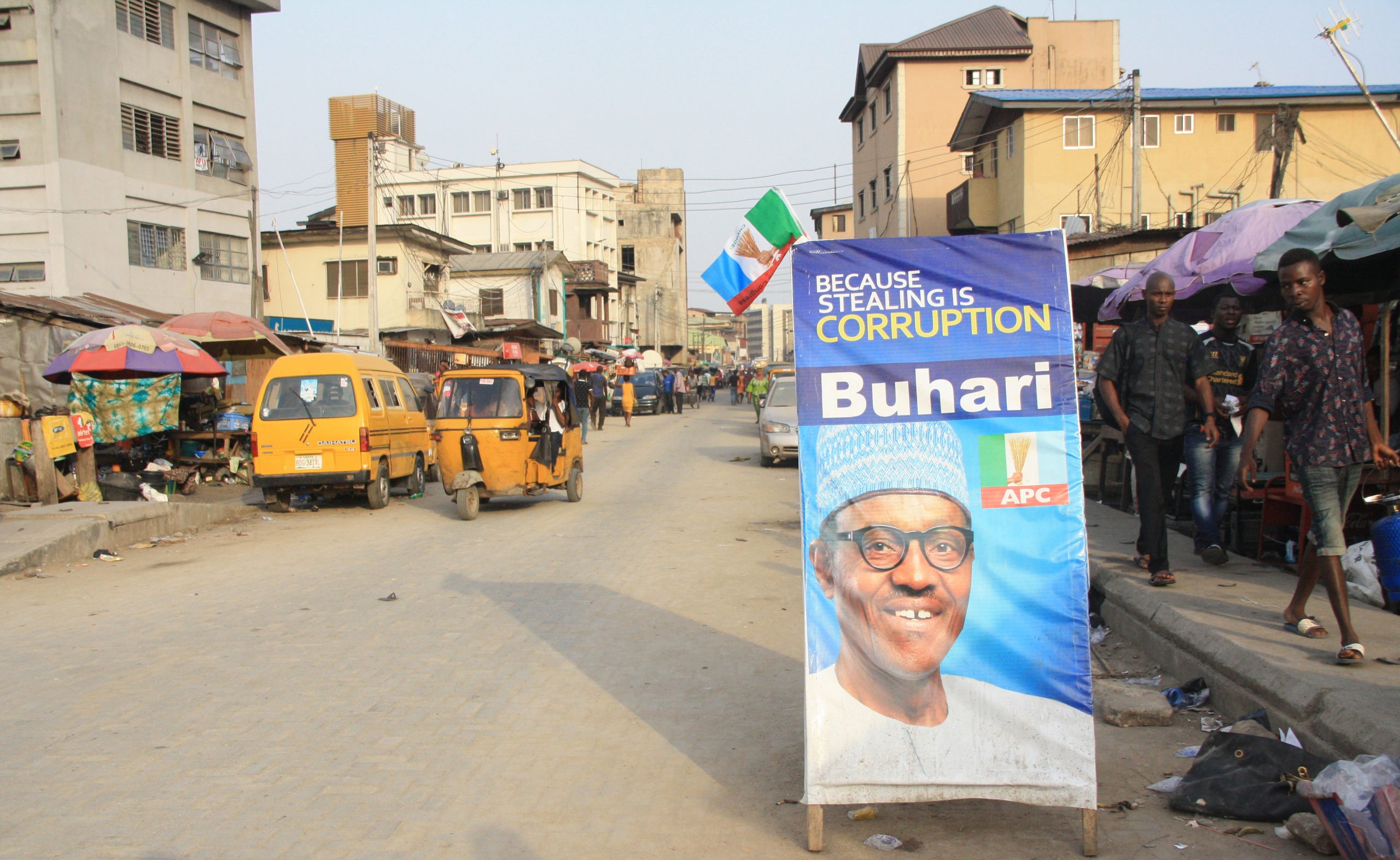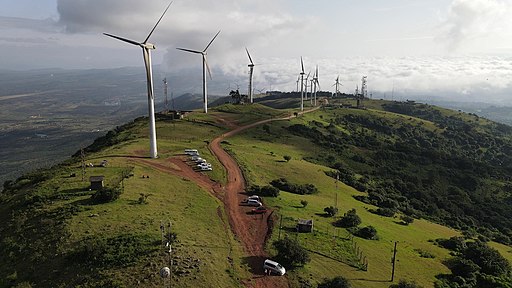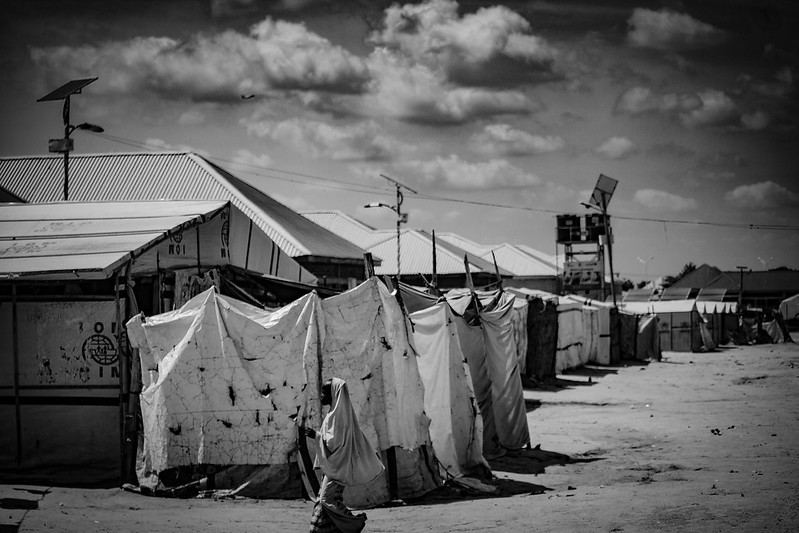Two days from now, as many as 93 million people will head to the polls in what is shaping up to be the most competitive presidential election since Nigeria’s transition to democracy in 1999. It is likely to be a record-setting election in many ways. There are a record number of registered voters, more than a third of which are voters under 34. Levels of activism and civic engagement are higher than in previous elections. And perhaps most significantly, a three-candidate race is shaking up historic voting patterns and a two-party dominance. At the same time, these elections come at an especially challenging time for Nigeria. A majority of the population is living in poverty, much of the country is racked with insecurity, and the economic conditions seem to be worsening, not improving for the average citizen.
The 2023 elections mark a pivotal moment in an extremely tumultuous period for Nigeria – offering both hope for democratic movements and trepidation that this election may be marred by the violence and election manipulation that has characterized previous elections. This article serves as a backgrounder on the elections, explaining how they will be conducted, reasons why these elections are different, who the main candidates are, as well as some of the key electoral challenges.
The Nigerian Elections in Context
The current president, Muhammadu Buhari, is term-limited and seems determined to make a democratic transition a key part of his legacy. President Buhari took office in 2015 with campaign promises to tackle insecurity and a stalling economy. Eight years later, over half of the country is living in poverty, insecurity stemming from banditry, kidnapping, and Boko Haram affects much of the country, and average citizens face major economic challenges including inflation rates of more than 20 percent. According to Afrobarometer, almost nine out of ten Nigerians (89%) say the country is going in “the wrong direction,” a 20 percent increase from 2020. Nigerians are frustrated with the direction of the country and the election may be an opportunity to change course.
By the numbers, Nigeria’s presidential election is stunning. There are 18 political parties fielding 15,331 candidates for 1,491 positions. This means that on average, there are ten candidates contesting for almost every elected position from the president down to state houses of assembly. At the national level, there are 18 candidates for president, which while seemingly high for a political system dominated by two parties, is still a significant decrease from 2019 when there were 73 presidential candidates.

Nigeria’s elections are conducted in two parts. The president/vice-president and National Assembly members (senators and representatives) are elected on February 25th and the governors and State Houses of Assembly members (senators and representatives) are elected two weeks later on March 11th. In the last seven elections, the votes have often been postponed. In 2019, the elections were postponed a few hours before the polls opened. However, both President Buhari and INEC Chairman Mahmood Yakubu, have repeatedly stated that the 2023 elections will be held as scheduled.
Nigeria has many political parties (which are often changing), but it is primarily dominated by two parties: the All Progressives Congress (APC) and the People’s Democratic Party (PDP). Only the APC and PDP have held the presidency and held majorities in the National Assembly (NASS).
To win the presidential election, the candidate must receive the highest number of votes in the election and at least 25 percent of votes cast in each of at least two-thirds of all the States in Nigeria. This is to ensure that a candidate seeks the votes of Nigerians across the country, not just in their region or around major urban areas. If this threshold is not met, something that many believe will be the case in this election, a run-off election will be held within 21 days. The candidates selected for the run-off will be a) the candidate who received the most overall votes (regardless of whether they meet the 2/3rds rule), and b) of the remaining candidates, the one who has a majority of votes in the highest number of states. To date, Nigeria has never had a run-off election for president. In the last twenty years, however, there has never been as serious of a challenger to the two-party dominant system.
Youth Rising
One of the exciting elements of the 2023 election is the historic number of young people registered to vote. Of the 93,469,008 registered voters, more than 37 million are between the ages of 18-34. This means that more young people are registered to vote in the 2023 election than the total number of Nigerians that voted in the 2019 general election (28.6 million votes were cast).

Source: Independent Nigerian Electoral Commission
The historic number of young people who have registered to vote has been driven by a combination of high youth unemployment, a lack of opportunities, frustrations over poor and at time brutal governance, and the perception that their government does represent young people. Some of this can be traced back to the EndSARS protests in 2020 when millions of Nigerians, especially young people took to the streets to protest police brutality, and later to protest issues of corruption, poor governance, and broader injustices. As Damilola Agbalajobi wrote in 2020, the protests were the “result of pent-up anger over the dehumanizing policies of government, maladministration, injustice, hunger as well as high energy and fuel prices.” As one Nigerian protest participant told me about the impact of the EndSARS protests:
“There were so many people that woke up. Before, we didn’t care about politics because it was so hopeless. Young people were thinking only of ways to leave or how to ignore the bullshit. Young people weren’t thinking about voting. People weren’t thinking in terms of how can we survive this. For the younger generation at least, this changed our perspective and I don’t think people will go back before that.”
It seems that her analysis has held true. Instead of turning away, young people may be engaging with the political system by not only registering to vote, but by choosing to run for office, getting involved with civil society groups, and pushing for electoral reform (such as the Not Too Young to Run Bill). A level of civic involvement that may have been helped by the fact that the largest demographic of voters are students (26 million). This is significant when you consider that public universities were on strike over better pay for almost two-thirds of 2022 leaving students even more frustrated and unoccupied. Election day may be an initial test of youth involvement in politics, but by no measure does it seem that young Nigerians are willing to go back to sleep.
Who are the Presidential Candidates?
Historically, the race for president has been a two-party race dominated by the two largest political parties, the APC and PDP. However, this year, the race is seen as a contest between three candidates with the strength of each candidate depending on who you speak to, which polls you look at, and the likelihood that one candidate may take away votes from another. The candidates’ political platforms are quite similar with promises to improve the country’s economy, fight insecurity, and address rampant corruption. However, given each of the candidates’ personal histories, these campaign promises resonate differently among voters.
Bola Tinubu – All Progressives Congress
Bola Tinubu, age 70, is a familiar face in Nigerian politics. Tinubu is a democratic activist turned politician turned billionaire businessman. During the military dictatorship of the 1990s, Tinubu campaigned for the return to democratic governance and co-founded the Alliance for Democracy, one of the major political parties fielding candidates in 1999. He served as the governor of Lagos state from 1999 to 2007, when Lagos attracted significant foreign investment and grew massively. Tinubu is controversially running on an all-Muslim ticket with former governor of Borno State, Kashim Shettima. Historically, presidential and vice-presidential try to religiously (Christianity and Islam) and geographically (North and South) balance presidential tickets. However, Tinubu bucked this tradition saying he chose the person he thought most capable for his running mate.
Tinubu is seen as one of Nigeria’s infamous political ‘godfathers’ pulling the strings for certain individuals to get party nominations and using his immense wealth to finance their campaigns. In addition to founding and financing the Alliance for Democracy, Tinubu also helped to establish the All Progressive’s Party, a coalition of political parties in the lead-up to the 2015 elections and one of the dominant parties today. He is seen as hand-selecting his gubernatorial successors in Lagos and credits himself as one of the reasons that Buhari was elected in 2015 and 2019. In 2019, rumors circulated of bullion vans leaving his compound during the election period, a rumor which he did not deny, but replied saying that “if I have money to spend in my premises, what is your headache? . . . if I like, I give it to the people free as charge as long as [it is] not to buy votes.” During campaign events for the 2023 election, Tinubu has repeatedly said that “it’s my turn” to serve as president, leaving some voters feeling that he is approaching the presidency from a sense of entitlement, not necessarily public service.
As with many politicians, allegations of corruption and questions over the source of his wealth have plagued Tinubu. He recently stated that the source of his wealth was real estate that he inherited. In the past, he has also said that he became an “instant millionaire” while working as an auditor at Deloitte and Touche.
Tinubu has been described by some as a shrewd political operator. Dapo Thomas, a political science lecturer at Lagos University described Tinubu as “a very aggressive, very solid political machine.” While he may be a solid political machine, there are major questions over how willing he is to engage with voters. In the 2023 campaign season, Tinubu shrugged off many of the public requests for debates and interviews. For example, in a December 2022 event at Chatham House, one of his few interactive events, he directed all audience questions to his campaign staff. Time will tell how he does on election day.
Atiku Abubakar – People’s Democratic Party
Atiku Abubakar (Atiku) is a very familiar face in Nigerian politics. A Muslim from Adamawa State, Atiku was a civil servant in the 70s and 80s before becoming a businessman. In the 1990s, he entered politics and served as vice president under Olusegun Obasanjo from 1999 to 2007. For many Nigerians, however, he stands out because this will be his sixth presidential campaign in the last two and a half decades, including one attempt at contesting with the APC party. During his time in office, Atiku oversaw the privatization of hundreds of government-owned enterprises. Privatization of unprofitable GOEs, such as Nigeria’s underperforming oil refineries, continues to be part of his political platform. Some argue he made millions on the side, something that has not been proven, but his immense wealth have left people speculating. Atiku’s running mate is Ifeanyi Arthur Okowa, a Christian from oil-producing Delta State.
Since securing the PDP nomination, Atiku has faced intense infighting within his party, especially from other presidential hopefuls. A group of his biggest critics has become known as the G5. Led by Nyseom Wike, the current governor of PDP stronghold Rivers state, has refused to publicly support Atiku citing concerns over the party leadership. Wike even barred Atiku from holding a campaign rally in Rivers State. Wike and the G5 said they will announce on election day who they will support and more importantly, who they will ask their constituents to support in the election. Wike has allegedly appointed 200,000 polling unit aides to ensure his supporters vote for who he chooses on election day.
While Atiku has the political recognition and an immense fortune to support his campaign, many Nigerians doubt whether he could win the election, especially as Peter Obi may pull southern votes that may have otherwise gone to Atiku.
Peter Obi – Labour Party
Peter Obi, is the candidate that is shaking up Nigeria’s two-party system and capturing the hopes of millions of Nigerians. Obi, a 61-year-old Christian from Anambra state, is a wealthy businessman and former governor of Anambra state. Obi has tried to use his record as governor to demonstrate his commitment to accountability and ending endemic corruption. A common campaign slogan at his rallies is “it’s time to take your country back,” referring to elite politicians who have pilfered the state. He has framed himself as the anti-establishment candidate and mobilized a large number of young supporters.
Obi originally planned to contest to be the PDP’s presidential candidate, but left the party three days before the presidential primary saying “developments within our [the PDP] party make it practically impossible to continue participating and making such constructive contributions.” Others have said Obi left the PDP because he refused to participate in buying votes to secure the PDP nomination for president. Interestingly enough, Obi was Atiku Abubakar’s running mate in the 2019 election under the PDP banner.
Since becoming the Labour Party’s candidate for president, Obi has gained followers from across the country, some of which self-describe as Obi-dients. Obi described his voters saying people are supporting him because they see “failed governance but looking very eager and willing to see a new Nigeria.” As a third-party candidate who has gained support across the country, Obi’s campaign has upended historical voting patterns as well as the two major party’s campaign playbooks.
While Obi consistently tops the polls, he faces an uphill battle to win the election. He is more popular in the South than the North and the Labour Party do not have the nationwide structures that PDP and APC do to mobilize voters. One Nigerian I spoke with said, “yes Obi may popular, but at the end of the day, at the local level, it is the party that will deliver for voters, not the candidate.” Many Nigerians I spoke with see Obi as the best candidate, but are unsure if they will vote for him in part because they are not sure if he can win.
A Strengthened Voting System under Stress
The 2023 elections will be not only a test of democratic participation and competition but also a test of whether the electoral system can withstand election rigging strategies and election violence that have plagued previous elections.
To strengthen the integrity and transparency of the voting process, in 2022, Nigeria passed the Electoral Act. Among its provisions, it legalized the use of technology to accredit voters and electronically transmit votes. By ensuring biometric verification of voters and electronic transmission of votes cast, the act seemed to mitigate election rigging strategies of ballot box stuffing or snatching. This has given many Nigerians greater confidence that the ballot they cast on election day may actually be counted the way they cast it, though they are still concerns over whether the machines can be hacked. While the Electoral Act may address some election manipulation strategies, others are still at play – most significantly election violence and vote-buying.
Vote-buying is a common election manipulation tactic in Nigerian elections. Votes can be bought for anywhere from $1-2 or for food or small goods. More than 78 percent of Nigerian voters do not agree that they should sell their vote, but given the challenging economic conditions, threats of violence, and skepticism on whether their vote will be truly counted, many see vote-buying as an understandable behavior.
One strategy to cut down on vote-buying is to try to go after the amount of money that candidates have to buy votes. Nigerian elections are notorious for being immune to campaign spending limits and have little transparency on where funds come from or how they are used. Partially motivated by the desire to cut down on vote buying in the 2023 election, the Central Bank of Nigeria announced in October 2022 that it was redesigning the currency and would require all Nigerian currency to be changed out at banks. This set of an initial run on foreign currencies sending the Naira to less than half its value on the black market and combined with the CBN’s inability to produce sufficient new currency, has created a nationwide shortage. As Idayat Hassan, Executive Director of the Centre for Democracy and Development recently pointed out, the currency swap may have the opposite effect and “actually make vote buying to become cheaper because here everybody needs some cash.”
In addition to vote-buying, violence is also used by various actors by attempting to intimidate candidates and voters and disrupt voting. Election violence has become so common, that since 2015, candidates are asked to sign a peace accord stating that they will not use violence as a tactic or resort to violence if they do not agree with the election outcome. This year, because of the number of electoral violence incidences, the candidates were asked to sign the pledge twice. Violence targeting candidates (such as the attacks on Atiku’s and Obi’s campaigns) can be an attempt to intimidate opponents, disrupt their campaigns, or scare away potential supporters. Violence targeting polling units can be driven by a desire to shut down polling units in areas that may be strongholds for certain candidates or in an attempt to delay the election.
Since January 1, 2022, ACLED has recorded more than 4,267 instances of electoral violence which have claimed over 11,000 lives. Of these events, over half have been violence targeting civilians.
Democracy at Work
If all goes to plan, millions of Nigerians will go to the polls on February 25th to select national-level officials and hopefully again on March 11th to select state-level officials. More than 140,000 domestic and international election monitors, the most in Nigeria’s history, have been deployed across the country. Buhari continues to reiterate his commitment to free, fair, and on-time elections. For now, there is a sense of hope and trepidation. However, no matter the outcome of the election, the work for Nigeria to live up to its democratic promise will continue long after the ballots are cast and far beyond a single election cycle.
Featured image: Nigeria Elections 2019 – by Commonwealth Secretariat. Attribution-NonCommercial 2.0 Generic(CC BY-NC 2.0)



